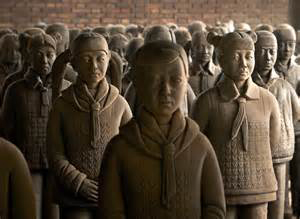|
查看原文
When Emperor Qin Shi Huang, the first emperor of China, anticipated his death more than 2,000 years ago, he wanted an army of warriors to guard his mausoleum forever and protect him in the afterlife.
So he ordered the creation of some 8,000 terra-cotta soldiers, along with hundreds of terra-cotta horses and chariots, to be buried with him in his tomb. Historians speculate the soldiers were modeled after eight individuals. When the statues were discovered by workers digging a well in Xi'an, Shaanxi Province, in 1974, the world was stunned by the spectacular funerary art and the legacy of the powerful emperor. Since then, it's become a major tourist attraction and a World Heritage site.
Now, these soldiers have a counterpart: female terra-cotta warriors.
Prune Nourry, a Paris-born artist based in New York City, has created a small army of them. In "Terracotta Daughters," 116 are featured in an exhibition at the China Institute from September 10 through October 4. The show's US premiere is presented by theFrench Institute Alliance Francaise and China Institute as part of FIAF's Crossing the Line festival.
The difference is these female terra-cotta warriors are not out to protect any emperor, but were created to bring attention to the plight of girls in China.
"In China, there is a huge imbalance between boys and girls. I wanted to highlight the issue of gender preference," said Nourry. "I needed a strong cultural symbol to base this project on, and a universal one that would speak both to Chinese villagers in the countryside and to citizens abroad."
And, in a striking parallel to the terra-cotta soldiers, the terra-cotta girls will also become an archaeological project. After the exhibition, they will be buried in China until 2030, the year that, according to Chinese sociologists, men will have the hardest time finding a wife because of the skewed gender ratio.
The imbalance of the sexes is a serious problem for the Chinese. A 2010 census indicates there are at least 34 million more men than women. Due to the one-child policy and traditional preference for boys, as well as sex-selective technologies, China will have a huge surplus of men, which presents daunting demographic challenges for the world's most populous country.
Perhaps for those reasons, Nourry didn't encounter difficulties with the Chinese government in pursuing this project in China. She started working on the terra-cotta statues two years ago after finishing an installation in India that also explored gender bias.
In deciding on the size of the female army, Nourry chose the number eight because of its auspiciousness in Chinese culture. She created the first eight statues modeled after eight girls whom she met through an orphan charity in China.
Then, working with local craftsmen in Xi'an, 108 permutations of statues were made based Nourry's original eight statues by combining the different heads, torsos and legs. "For Xian Feng, the main craftsman I worked with in China, my project seemed at first impossible since women 'can't be soldiers.' But after we began the project, he changed his view and even turned one of the 108 combinations into a portrait of his own daughter," said Nourry.
The local craftsmen of Xi'an are used to making copies of the terra-cotta warriors which are sold primarily to tourists. When Nourry asked them to give their artistic interpretation in sculpting the female statues, they were initially tentative. Over time, they lost their hesitancy and gave each statue unique faces. No two statues have the same features.
Each terra-cotta warrior girl stands nearly 5 feet tall and weighs about 260 pounds. Their hairstyles are contemporary, as are their uniform, which is modeled after the orphan girls' school attire. Unlike the male warriors, they look approachable, friendly and even charming.
"It was a very enriching collaboration, based on exchange and mutual respect," said Nourry.
Her favorite moment was when the eight girls saw the terra-cotta statues of themselves and were delighted. Part of the proceeds from the sale of the eight original statues will pay for the cost of the eight girls' education for three years.
"Terracotta Daughters" is impressive in its artistic craftsmanship and social statement. It's a refreshing reinterpretation of one of China's national symbols. With these modern female warriors, Prune raises the pressing issue of gender discrimination without pointing fingers at anyone or anything. One looks at these amazing terra-cotta statues and feel compelled to ask -- why aren't there more of them? And why aren't there more girls in China?
|
查看譯文
2000多年前�,當(dāng)中國第一位皇帝秦始皇預(yù)見到自己駕崩時,他想要一支兵馬俑能在陰間永久守護(hù)他及他的陵墓��。
所以,他下令建造約8000名兵傭���,以及數(shù)以百計(jì)的馬傭和戰(zhàn)車作為陪葬�。歷史學(xué)家推測這些士兵是模仿八個不同的人建造的��。1974年�����,陜西西安的農(nóng)民在打井時發(fā)現(xiàn)了這些雕像��,這種壯觀的喪葬藝術(shù)及強(qiáng)大王朝的傳奇讓世界為之震驚。從此以后�,那里就成為主要的旅游景點(diǎn)和世界文化遺產(chǎn)。
現(xiàn)在����,這些士兵在性別上有了對應(yīng):女兵馬俑。
出生于巴黎的紐約藝術(shù)家蒲玉娜·諾赫伊(Prune Nourry)創(chuàng)建了這支女兵馬俑���。由116件塑像組成的“女童俑”(TerracottaDaughters)將于9月10日至10月4日在中國研究所展出���。這次展覽的美國首映是由法國文化協(xié)會(French Institute Alliance Francaise)和中國研究所(China Institute)共同承辦,這也作為法國文化協(xié)會越界節(jié)活動的一部分�。
不同的是這些女兵馬俑不是用來保護(hù)皇帝的,而是用來引起對中國男女不平衡狀態(tài)的關(guān)注�。
“在中國,男女之間存在著極大的不平衡��。我想強(qiáng)調(diào)的是性別偏好問題����,”諾赫伊稱?��!拔倚枰粋€強(qiáng)有力的文化標(biāo)志融入到這個項(xiàng)目�����,以及中國農(nóng)民和海外公民都看得懂的標(biāo)志�����?����!?/p>
并且和兵馬俑類似�����,這些女童俑也將成為一個考古項(xiàng)目�。展覽結(jié)束后��,它們會被埋在中國直到2030年�����。據(jù)中國社會學(xué)家稱�����,因?yàn)橹袊詣e比例失調(diào),那一年將是男性最難找到配偶的時期�����。
性別比例失衡對于中國人來說是個嚴(yán)峻的問題���。2010年的人口普查表明�,男性至少比女性多3400萬人�。由于獨(dú)生子女政策,傳統(tǒng)的重男輕女觀念以及性別選擇技術(shù)��,中國將出現(xiàn)男性過剩��,這也為這個世界人口大國帶來嚴(yán)峻挑戰(zhàn)���。
也許因?yàn)檫@些原因���,諾赫伊在中國推行這個項(xiàng)目并沒有遭到中國政府的為難。兩年前�,在結(jié)束印度同樣探究性別歧視的裝置作品展后,她開始建造兵馬俑��。
在決定女子軍隊(duì)規(guī)模上���,諾赫伊選擇了數(shù)字8����,因?yàn)樵谥袊幕?是吉利數(shù)字。通過中國的一所孤兒院��,她選擇那里8個女孩為原型創(chuàng)建了頭8個雕像���。
然后����,根據(jù)諾赫伊原始的8個雕像�����,通過結(jié)合不同的頭像���、軀干和腿,她與西安當(dāng)?shù)毓そ秤纸ㄔ炝?08個雕像���。諾赫伊稱“在中國和我一起共事的主要工藝師為憲峰(音譯)����,起初我的項(xiàng)目不太可能完成因?yàn)榕浴豢赡艹蔀槭勘5谖覀冮_始這個項(xiàng)目后���,他改變了看法�,甚至把其中一個雕塑頭像變成了她女兒的���?����!?/p>
西安當(dāng)?shù)毓に噹熯^去常制作兵馬俑仿品賣給游客��。當(dāng)諾赫伊要求他們在塑造女性雕像融入他們的藝術(shù)詮釋時��,他們最初還比較猶豫��。隨著時間的推移����,他們不再猶豫���,給每個雕像塑造了獨(dú)一無二的頭像�。沒有任何一個雕像重樣���。
每個女童兵馬俑近5英尺高��,約260磅重���。她們的發(fā)型是現(xiàn)代的���,他們的穿著也同樣現(xiàn)代化,這是仿照孤兒院女孩的學(xué)校服裝����。不同于男兵馬俑,她們看起來更平易近人�����,友好����,并且充滿魅力�����。
諾赫伊稱“這是一次基于交流和相互尊重的十分充實(shí)的合作��。”
令她最開心的時刻是�����,當(dāng)8個女孩看見自己的兵馬俑雕像時的欣喜����。8個原始雕像所賣收入的一部分將用于支付這8個女孩三年學(xué)費(fèi)。 “女童俑”的藝術(shù)工藝和社會表現(xiàn)令人印象深刻�。這讓中國國家標(biāo)志煥然一新,給予了新的詮釋��。諾赫伊沒有指責(zé)任何人或任何事��,通過這些現(xiàn)代女兵馬俑揭露了性別歧視問題����。有人看了這些令人驚嘆的兵馬俑后,不禁問道——為什么這樣的雕像不再多點(diǎn)����?為什么中國不能有更多的女孩?
(譯者 honey琦琦 編輯 丹妮)
掃一掃��,關(guān)注微博微信
 
|

